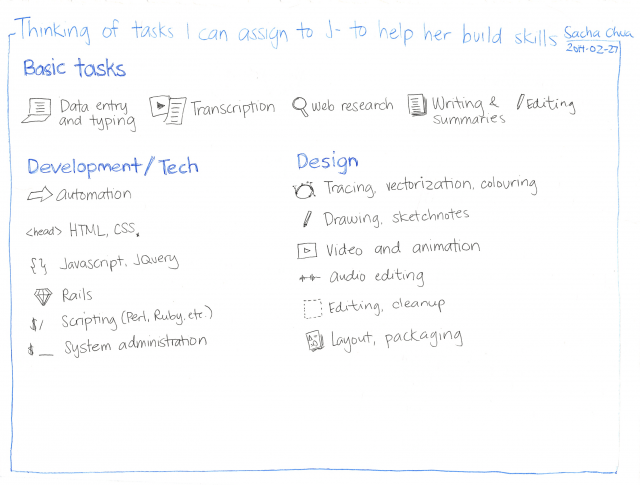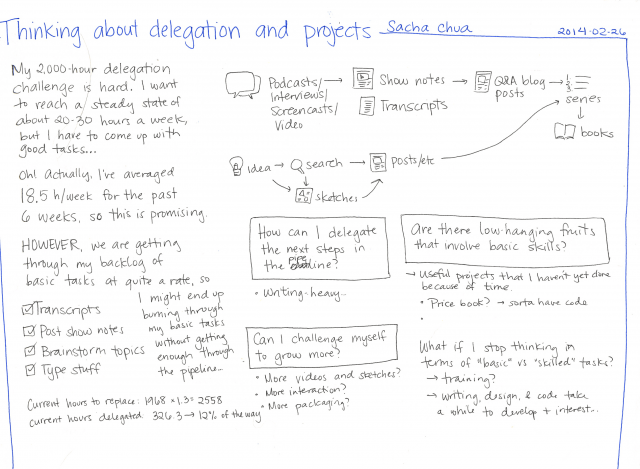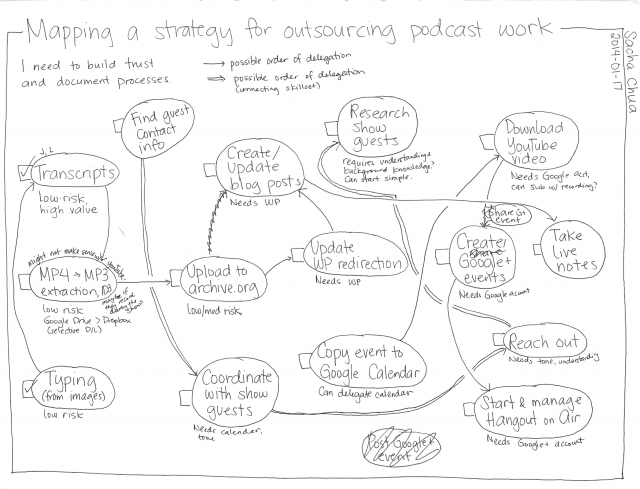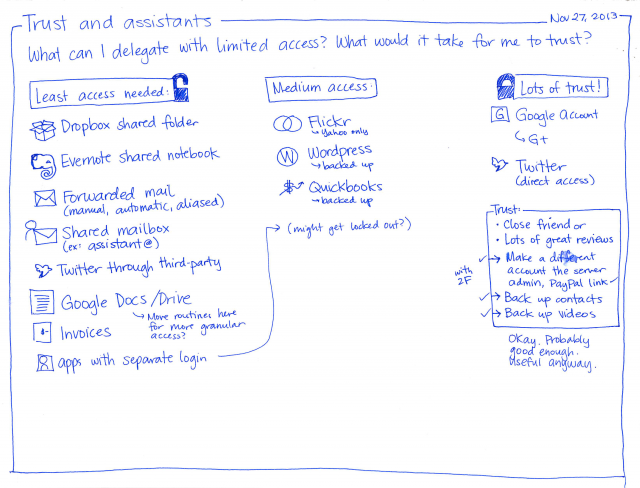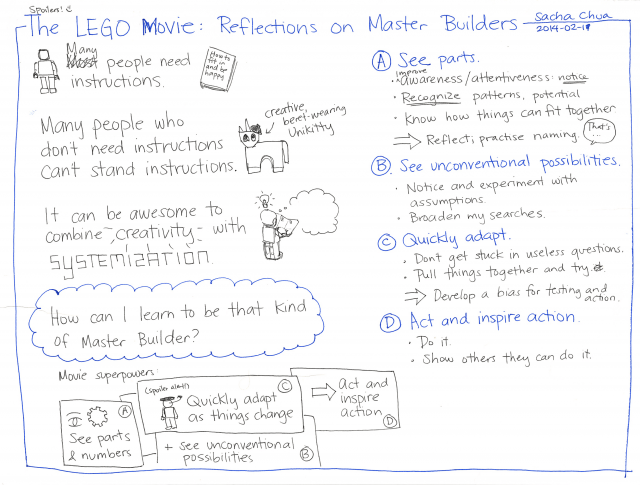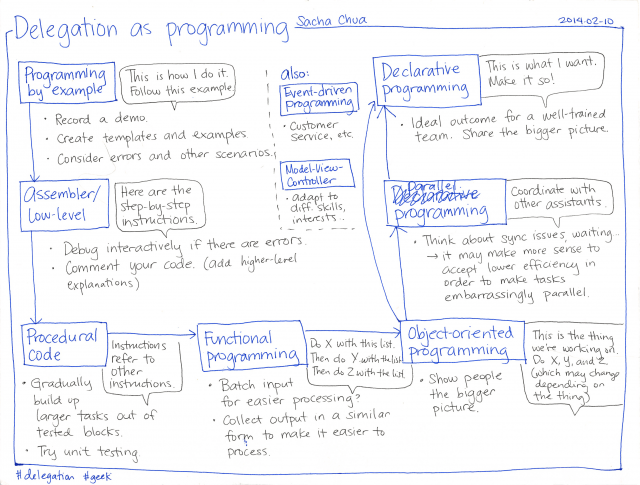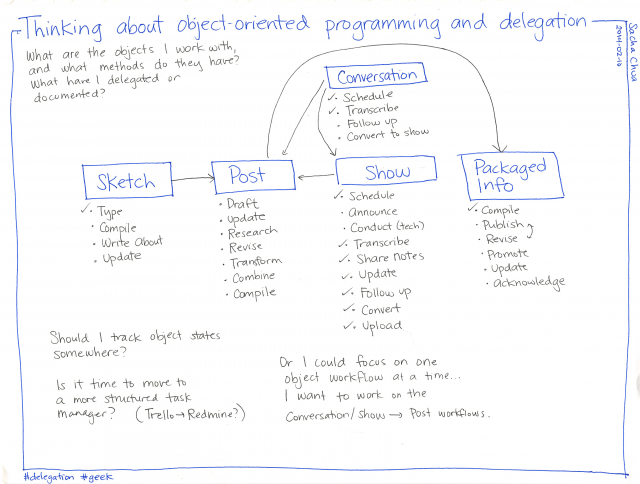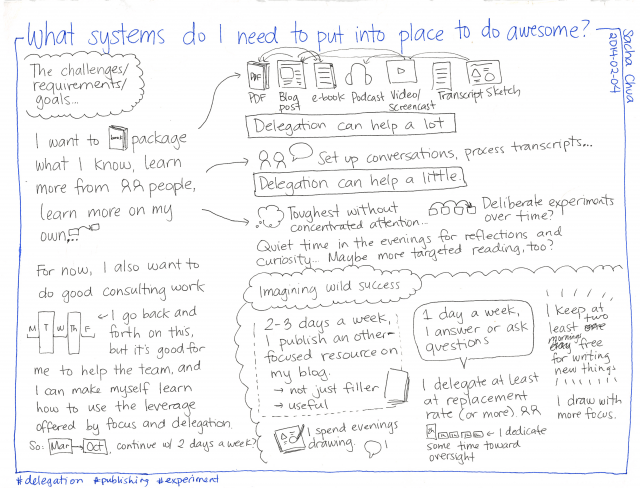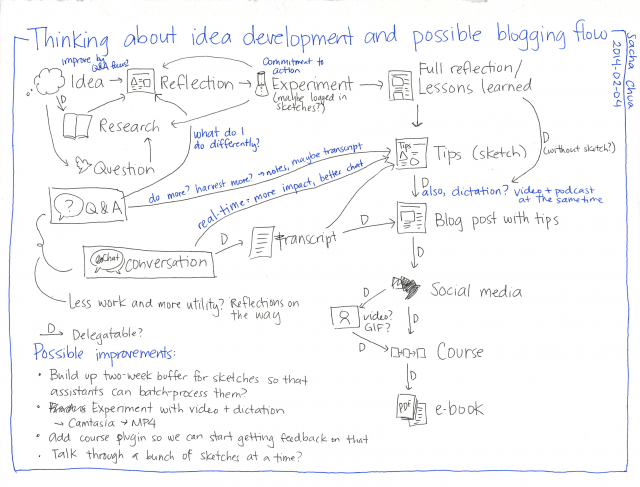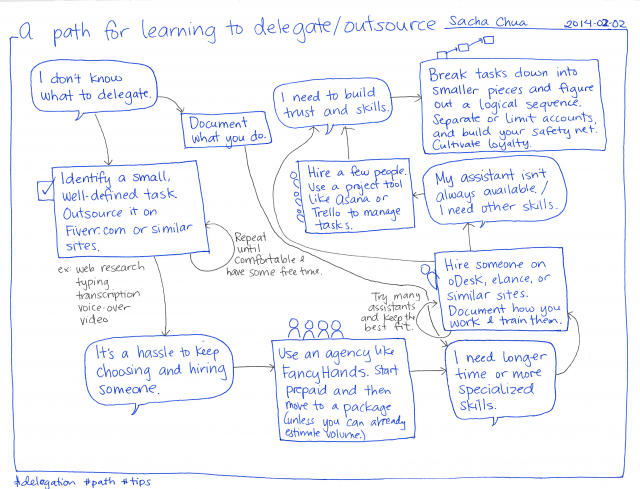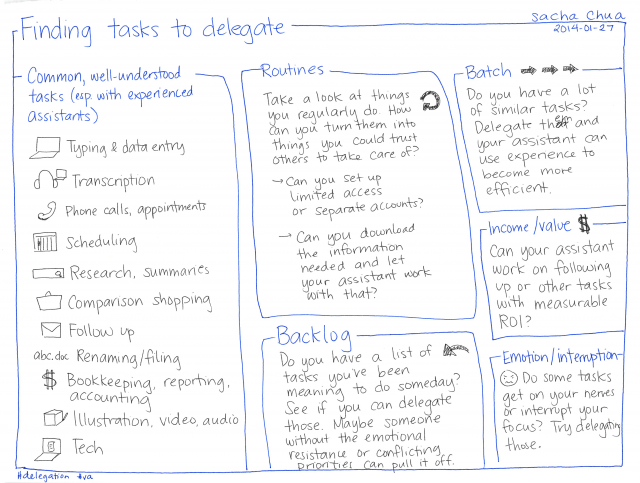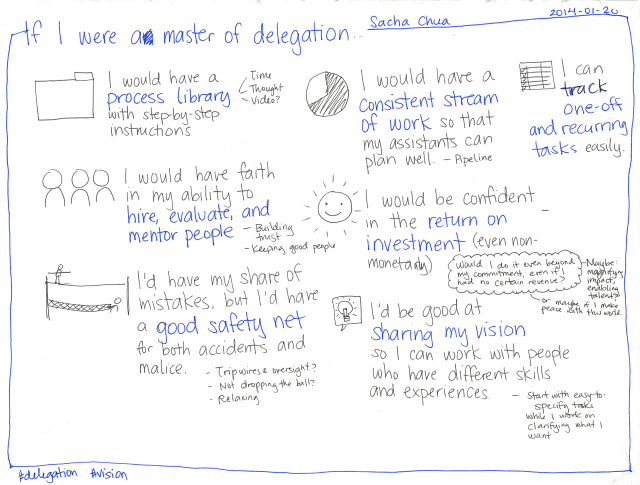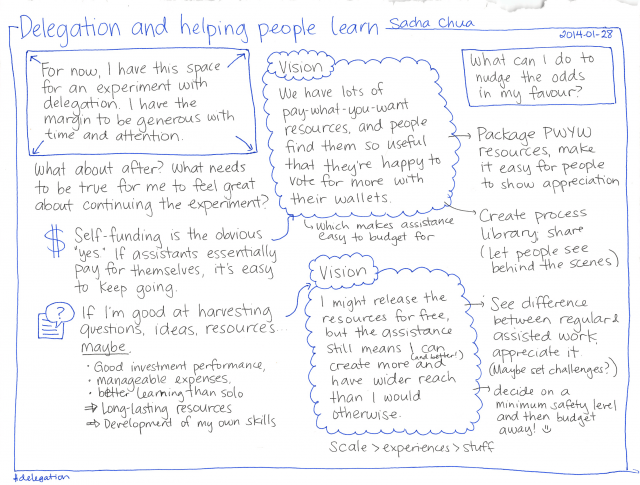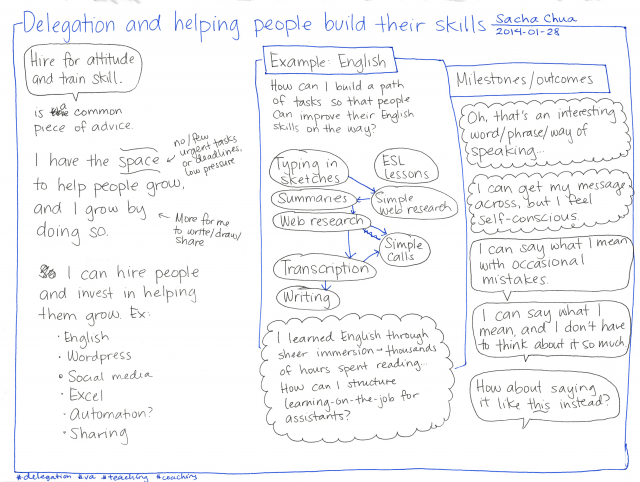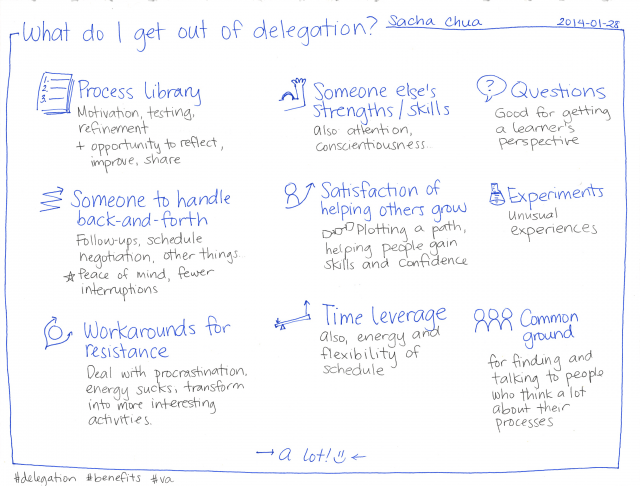The other week, I focused on exploring ideas and becoming my own client. Last week, I focused on the systems I can set up in order to keep on sharing while I'm distracted by work or other needs. The other week felt happier and more self-directed, but on reflection, last week is great for long-term learning and growth as well. I just have to keep tweaking the balance. Some weeks might be more exploratory, and some weeks might be more focused on packaging things and building processes. I'll probably spend more time on consultinfg going forward than I thought I would two weeks ago, but I can see the benefits of investing the extra income into building up my delegation skills and experimenting with business ideas. (Besides, my clients are nice, and I want to help them do well.)
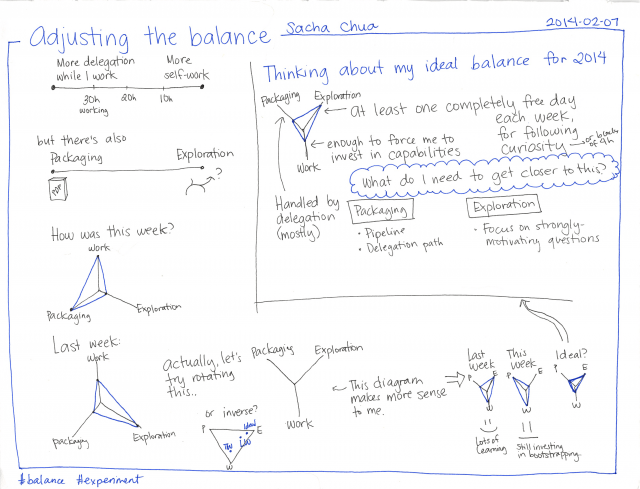
2014-02-07 Adjusting the balance
Thinking about this balance reminded me of this conversation that I had with Ramon Williamson, who has been thinking about the differences between artists and entrepreneurs. He's coming to terms with the fact that he wants to focus on just speaking and coaching, and he doesn't want to deal with a lot of the other small things that are part of building a business. It's like the way my dad focused on just photography while my mom took care of running the company. Ramon is looking for someone who can manage him. I think a lot of people are like that, even the ones who have been self-employed for a while. That's why partnerships often make sense, and why people often struggle with self-employment or self-directed learning.
I think of entrepreneurship as learning how to build processes, then systems, then businesses. It turns out actually enjoy doing this. I stayed up until 1 AM Sunday morning interviewing an applicant for a writing gig that I posted on oDesk. She seems fine, so I hired her and walked her through what I'm looking for. I'm excited about the possibilities. I briefly thought of agreeing to experiment with managing Ramon and using that as practice for developing my systems, but I've committed to doing public work that builds up my life brick by brick. So I'm going to invest in building up my processes and skills, but I'm going to do that with my own content. That will also encourage me to develop my “artist” side: writing, drawing, coding, sharing, and so on.
Does it always have to be a partnership between an artist and an entrepreneur, or can you do a decent job at both? It seems like artists need to partner with entrepreneurs, but entrepreneurs with artistic bents can sometimes pull things off on their own. I think it makes sense for me to focus on developing those entrepreneurship-related skills first. It might mean growing slowly as an artist, but I think processes can scale up art so much. For example, becoming really comfortable with delegation will allow me to imagine things that I can't do on my own. This seems to be something that lots of people struggle with. Most people I talk to have issues with trust, perfectionism, and other barriers. That means that it probably doesn't take that much effort to get good enough to distinguish yourself, so if I can get to that level, that would speed up my growth even more.
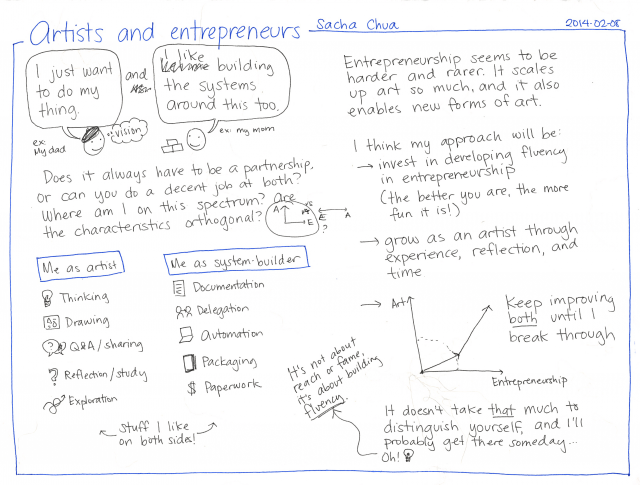
2014-02-08 Artists and entrepreneurs
People's interests and skills are unevenly distributed. In some areas, it takes a lot of effort to get good enough. In some areas, a little effort goes a long way. It reminds me a little of how one strategy for playing role-playing games is to be a munchkin: to maximize your strengths and minimize your weaknesses in a way that allows you to exploit the rules of the game. While that can lead to games that aren't particularly enjoyable (unless you're playing a game that makes fun of munchkinry), in life, a little of that strategy might be interesting. So, in the areas where I have unfair advantages–and in particular, unusual combinations of unfair advantages–I might be able to recognize opportunities for uncommon contributions.
This enjoyment of building processes and systems is one such unfair advantage. Coding is another, and delegation is almost like a people-version of coding. Frugality lets me take advantage of compounding interest. Reflective learning helps me take advantage of figurative compounding interest, which is enhanced by speed-reading my way through other people's experiences and insights. Satisficing and optimism allow me to avoid the dangers of perfectionism and make it easier for me to experiment and trust. Self-direction lets me use these advantages to my own ends instead of being limited by someone else's imagination or by a job description.
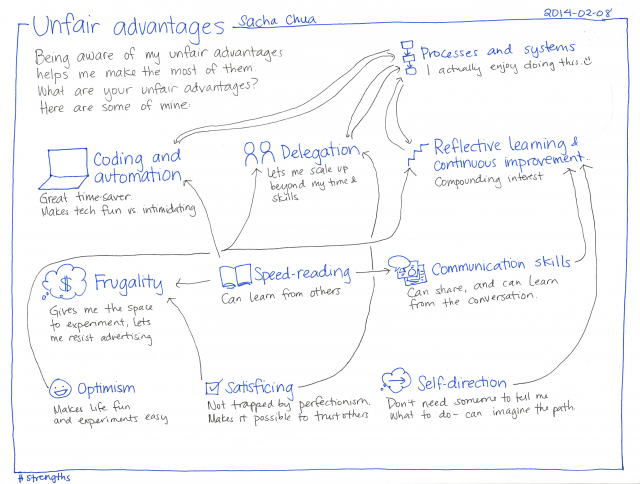
2014-02-08 Unfair advantages
It is a handy combination of advantages. You should be out there, Ramon said. Joining the ranks of infopreneurs (many of whom seem to make their money by telling other people how to be infopreneurs). Making things happen. Living the life. I'm a little meh about the idea. I'll grow at my own rate and at my own time. Plus, I like the free-and-pay-what-you-want model so much more than the buy-my-training-course-for-$X-hundred-dollars. I like the way it engages generosity and acts from abundance, both on my side (here is a gift!) and on other people's. (Here is some totally optional appreciation! Make more stuff like this.) I'll either figure out how to make that work, or I'll eventually come around to setting prices. In the meantime, I can focus on building up those unfair advantages at the same time that I'm building up the things I want to make with them.
For example: delegation. I like framing my work as something that people can flexibly do more or less of, depending on their schedules and energies. It's the same freedom I have with consulting, and I think it makes it easier for people who work for me as well. So it's not a fixed “You must work 20 hours a week” thing, but rather, “Here's a board with all the different tasks waiting for someone to work on them. Pick something you want to work on. You can work more hours on the weeks when you want to, and you can work fewer hours on the weeks that you need to. Just tell me if you need to be away for a while, so I can make sure that work gets reassigned.” I'll check in with my virtual assistants to see if this is working for them or if they need deadlines or set times for focus and motivation. Eventually I might work up to asking for consistent time slots so that I have an idea of turn around times, but the system seems to be working so far.
I've been adding more people to my virtual team. There's a range of rates (anywhere from $2-12/hour), and I'm working on gradually getting more of my assistants to deserve and totally justify higher rates. I proactively give them bonuses and raises, even. Instead of micromanaging who works on what in order to maximize cost-efficiency (approach A: different people for different skills; see diagram below), I'm experimenting with putting all the tasks on Trello and letting people choose from the tasks based on their skills and energy. If I've got good enough rapport with the team, then people might focus on the stuff that really justifies the value in their rate. I want to get to the point where people are generally cross-trained, so people can take the task and see it through end-to-end (approach D). I remember from Toyota's lean method that this makes work better (versus the assembly line, where you only see your small part).
I'm also working on chunking higher-level tasks – the delegation equivalent of going up a level of abstraction, writing procedures that call other procedures. (See my list of processes) For example, I started with separate tasks to extract the MP3, add metadata, upload to archive.org, transcribe the audio, etc. Now I'm testing the task of posting show notes, which includes all of those. Maybe someday I'll get to object-oriented programming!
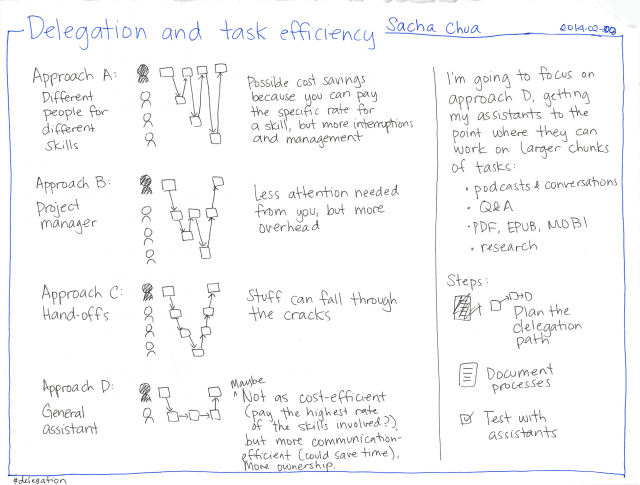
2014-02-08 Delegation and task efficiency
I started by mostly working on my podcasting flow, but I'm also experimenting with delegating other processes to support learning or sharing. For example, how can delegation support my drawing? My process is pretty efficient at the moment (aside from some cross-referencing data entry that I don't usually get around to doing myself), but if I batch things up more, maybe other people can help me tag my sketches and turn them into posts.
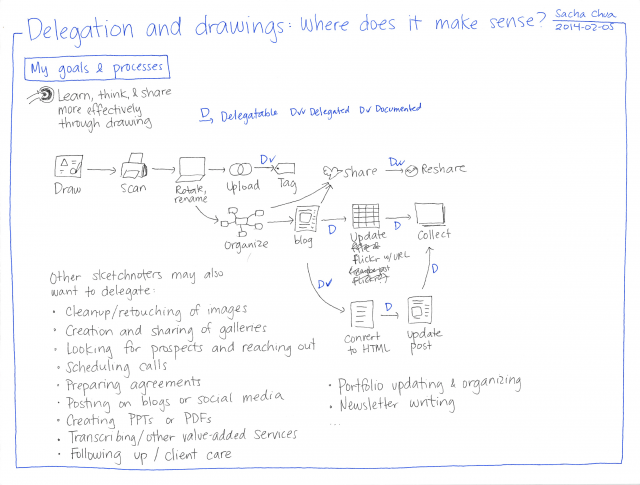
- 2014-02-05 Delegation and drawings – where does it make sense
Writing is another good candidate, too. Podcasting and drawing help with writing, so it all comes together. I want to get even better at pulling stuff out of my head and out of other people's heads, and getting those ideas into a form that other people can easily learn from. That's why I'm experimenting with getting writers to help me pull out ideas from Q&As in transcripts and from all these thinking-out-loud self-reflections that may be a little too long and rambling for most people to make the most of. For example, a reader-focused tips post based on this might just focus on building systems and omit the role-playing games references. The end goal for that one would be to have a blog that mixes shorter, focused tips with long behind-the-scenes notes, and to have e-books (and maybe even physical books!) that flow well. That way, it's good for people who just want a burst of inspiration so that they can get on with applying the ideas to their life, and it's also good for people who like seeing the verbose tracing messages as I think and learn.
It's a bit strange investing so much in the processes and output without yet building up the kind of audience and demand that justifies it, but I think it's the Right Thing to Do to have transcripts and follow-up blog posts and all that jazz. If I grow sustainably and keep an eye on my finances, I'll probably get to that take-off point right when I have the skills and systems to support it – and more importantly, the community. I figure it's much easier to build great relationships with confederates/tribe people (Hi!) and provide useful resources for searchers while I'm not distracted by the mainstream yet, and I might not even bother with going mainstream. I'm just going to focus on you, and maybe you'll find it so awesome that you'll bring in a few people for whom this is also a really good fit.
That seems to be the general pattern of how I'm learning about entrepreneurship. I'm investing in the capabilities now rather than waiting for demand to completely drive it – almost like my own little MBA. Still cheaper than $80k+ for an MBA at Rotman, and you'll get better value out of my “class projects” (like this free PDF/EPUB/MOBI of my No Excuses Guide to Blogging guide). At some point, we'll figure out a proper business model. Maybe it's sponsorship. Maybe it's pay what you want. Maybe it's membership, although we'll need to find something that doesn't involve just exclusive access to content, since I like making ideas as widely spread as possible. Maybe more of a coaching program? If you want me to sell to you, tell me how you want me to sell to you. (Comment, tweet, or e-mail me!)
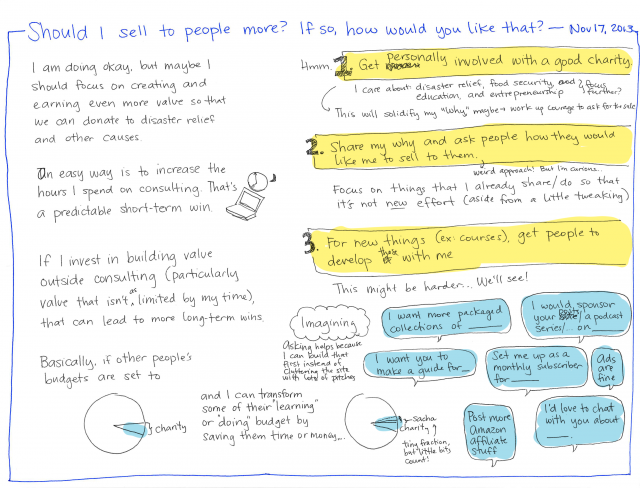
2013-11-17 Should I sell to people more – If so, how would you like that
(Although to be fair, there's probably a lot of demand already out there. People have been asking me for an Emacs book for years. Look! I've started drawing maps and other Emacs tips. It will happen. I just need to sit down and share more raw material. This means you need to sit down and ask me questions about stuff I'm taking for granted.)
Maybe it's a weird sort of entrepreneurship that I'm growing into, but I think it will be fun. How can I use what I'm learning to help you?

